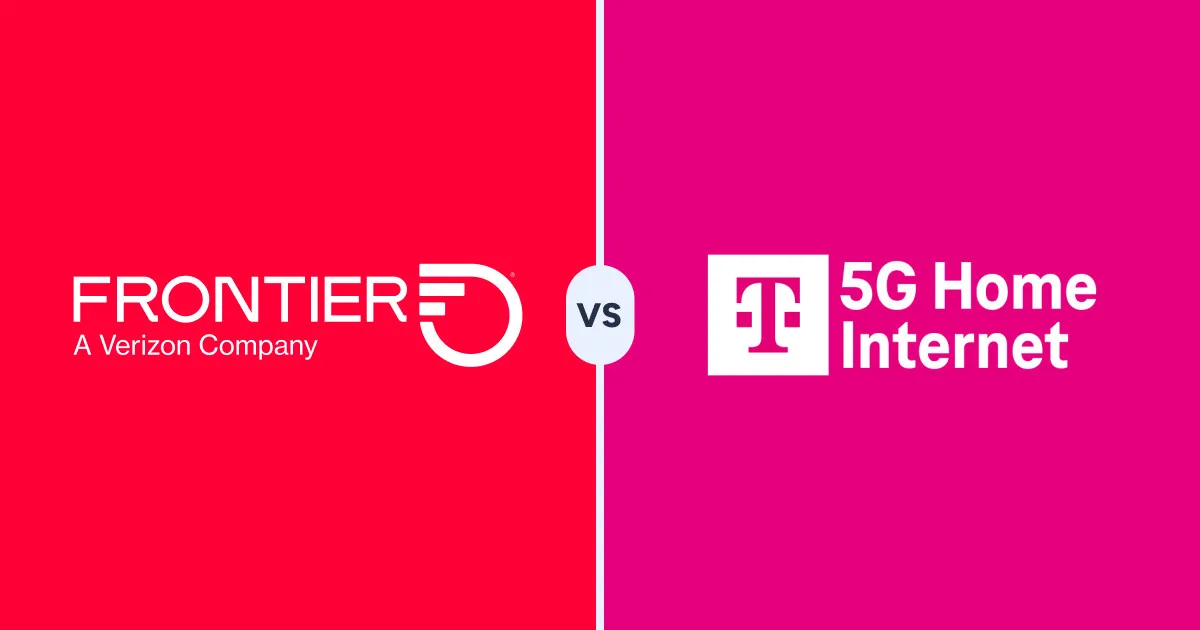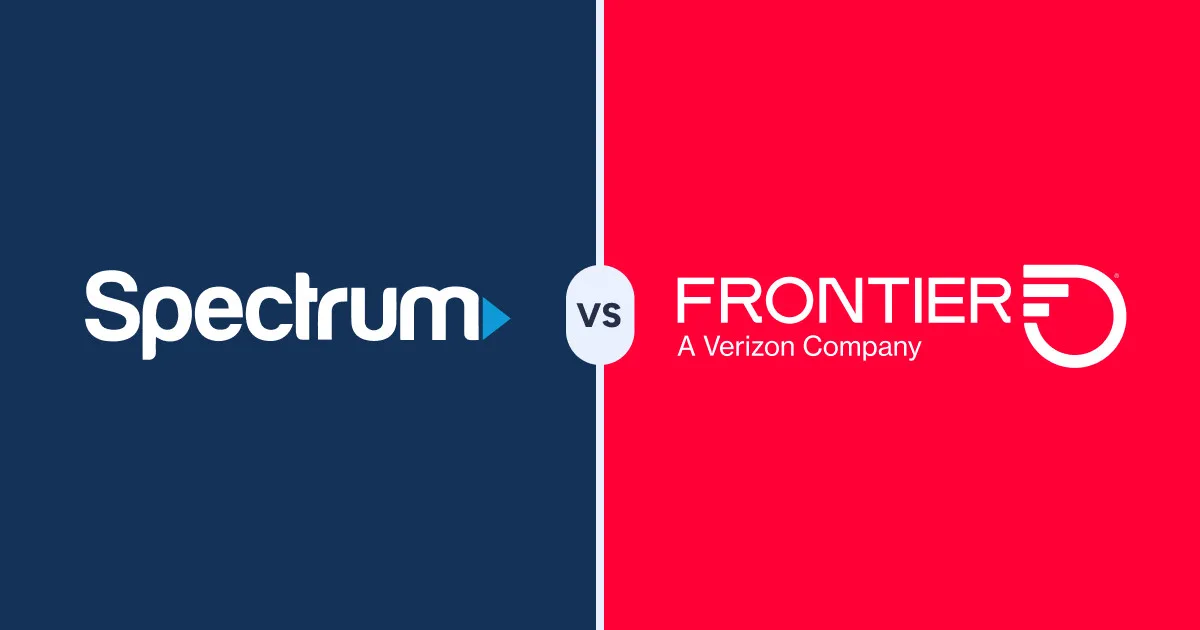AT&T vs. Xfinity: Which Is the Best Internet Service Provider?
Dec 22, 2025 | Share
Provider Comparisons (Versus)
-
Best for speed
- Price: $45–$155/mo.
- Customer rating: 3.9
- Speed: 100–5,000 Mbps
- Internet type: Fiber, DSL, fixed wireless
- Data cap: Varies
- Contract: No contract
-
Best for wide availability
- Price: $40–$100/mo.*
- Customer rating: 3.9
- Speed: 300–2,000Mbps
- Internet type: Cable
- Data cap: None
- Contract: No contract
See disclaimers.
Compare AT&T and Xfinity head to head
What can we say? We love fiber internet, so we think AT&T is the best option in this internet service provider (ISP) duel. AT&T’s fiber plans are fast (in some cases, really fast) and affordable. Xfinity still has some nice options, though, including lower-tier plans that won’t break the bank. Also, Xfinity is much more widely available than AT&T, so it’s a solid Plan B if you can’t get fiber in your area.
 Pros:
Pros:
- Wide availability
- Cheap options
- Unlimited data
 Cons:
Cons:
- Higher prices than AT&T for similar speeds
Not sure if AT&T or Xfinity are available in your area?
Enter your zip code below to find out.
In this comparison:
Plans and pricing | Extra fees | Customer ratings | Bundles | Internet connection types | Data caps | Contracts | Installation | Availability
In this comparison:
Plans and pricing: AT&T vs. Xfinity
Both AT&T and Xfinity provide internet plans with great value, packing in a lot of speed for the money. Xfinity has a slight edge on pricing, typically giving a bit more for a bit less, as well as bringing more mid-tier plan variety to the table. But AT&T plans have better perks, like unlimited data and symmetrical speeds (for its fiber plans).
AT&T plans and pricing
| Package | Price | Download speed | Type |
|---|---|---|---|
| Internet 100 | $45/mo.† | 100Mbps | Fiber |
| Internet 300 | $55/mo.* | 300Mbps | Fiber |
| Internet 500 | $65/mo.* | 500Mbps | Fiber |
| Internet 1000 | $80/mo.† | 1,000Mbps | Fiber |
| Internet 2000 | $125/mo.† | 2,000Mbps | Fiber |
| Internet 5000 | $155/mo.† | 5,000Mbps | Fiber |
| Internet Air | $60/mo.‡ | 300Mbps | Fixed Wireless/5G |
Read disclaimers.
How Much Internet Speed Do You Need?
Est. Time: 60 seconds
Answer 6 questions and get a personalized internet speed recommendation!
How many people in your household use the internet/WiFi on a daily basis?
How many devices in your home connect to the internet, including tablets, gaming consoles, and smart devices?
How many people in your household work from home?
What video quality do you use for streaming TV and movies?
How intensely does your household participate in online gaming?
Does your household download large files from the cloud or via the internet?
AT&T’s multiple fiber internet packages offer great speeds at a fair price. Even better, upload speeds are just as fast as download speeds, making these plans perfect for upload-heavy activities like Zoom and hosting livestreams on Twitch.
The Internet Air plan, meanwhile, is one of the fastest 5G Home Internet services you can get from a major internet provider in the United States. Do you need speeds that fast? Chances are not really, but it’s there if you live with a large group of people (think 10 or more), spend a lot of time uploading/downloading huge files, or stream your online gaming escapades on Twitch.
Xfinity plans and pricing
| Package | Price* | Download speed | Type |
|---|---|---|---|
| 300 Mbps | $40/mo.* for 12 mos. | 300Mbps | Cable |
| 500 Mbps | $50/mo.* for 12 mos. | 500Mbps | Cable |
| 1 Gig | $70/mo.* for 12 mos. | 1,000Mbps | Cable |
| 1.2 Gig | $100/mo.* for 12 mos. | 1,200Mbps | Cable |
| 2 Gig | $100/mo.* for 12 mos. | 2,000Mbps | Cable |
Read disclaimers.
Xfinity’s plans vary slightly depending on the region you’re in. But wherever you are, you’ll get fast speeds and a range of price options. You won’t get the excellent upload speeds of AT&T’s fiber plans, but you can still get great performance and save some money by springing for one of the cheaper plans.
For your average household, we recommend the 500 Mbps plan, which finds a good balance between speed and price.

Deals and promotions: AT&T vs. Xfinity
- Get a reward card worth up to $200 when you sign up for 2-Gig or 5-Gig plan from AT&T Fiber by June 1, 2026
- Save 20% every month when you bundle unlimited wireless with home internet from AT&T
- Get up to $20 off your AT&T fiber internet plan every month for a year
- Enjoy a 5-year price guarantee on a 300Mbps internet plan for $40 per month, through Feb. 22
- Earn up to $500 per year by referring friends to Xfinity
- Get automatic enrollment in Xfinity Rewards for exclusive access to merch, free TV and movies, and rotating weekly offers

Pro tip:
If you’re not sure what internet speed you need, use our How Much Speed Do You Need? tool to get an idea.
You can also test your current speed with our speed test. That will give you an idea of whether you’re better off with a faster (or slower) package.
Extra fees: AT&T vs. Xfinity
Data as of 12/19/2025. Offers and availability may vary by location and are subject to change.
Most internet providers tack extra fees onto your bill. You’ll get charged extra for exceeding your data cap or for canceling your contract early, but both AT&T and Xfinity give you options for waiving fees or reducing them. If you’re late on payments, each has a grace period where you can have extra time to cover your bill before your service is shut off.
Both of these ISPs charge hefty fees for a professional installation. But with Xfinity, you can install your service for free if you opt for a self-install and pick up your self-install kit from an Xfinity retail location. We provide more info in our Xfinity self-install guide.
Customer ratings: AT&T vs. Xfinity
In our annual customer satisfaction survey, AT&T and Xfinity proved to be evenly matched, both tying for second-place scores in overall satisfaction. Xfinity scored better for speed and reliability, but AT&T customers gave higher ratings for customer service and price.
Are either of these providers available in your area?
You can find out by entering your zip code into our tool below.
Best TV and internet bundles
| Package | Internet speed | TV channels | Price | Order online |
|---|---|---|---|---|
| Xfinity 300 Mbps+ Choice TV | 300Mbps | 10+ | Starting at $68.00/mo.* | View Plans |
| Xfinity 500 Mbps+ Popular TV | 500Mbps | 125+ | Starting at $147.65/mo.* | View Plans |
| Xfinity 300 Mbps + Ultimate TV | 300Mbps | 185+ | Starting at $137.65/mo.* | View Plans |
| DIRECTV ENTERTAINMENT™ + AT&T Fiber Internet 300 | 300Mbps | 165+ | $129.99/mo.† for 24 mos. Plus taxes and fees | |
| DIRECTV CHOICE™ + AT&T Fiber Internet 300 | 300Mbps | 200+ | $144.99/mo.‡ for 24 mos. Plus taxes and fees |
Read disclaimers.
Since Xfinity is a cable provider, we’re not surprised that it has low prices and lots of options for bundle packages. We think the Popular TV plan is pretty groovy because it provides a good balance between price and value with over 125 channels.
Both of these providers also let you do triple-play bundles that include internet, TV, and landline phone service if you need it.
AT&T bundles it’s internet packages with DIRECTV, so you can get AT&T’s plan variety and up to 150 channels. You can stream DIRECTV to any TV without a satellite dish. You can also get traditional satellite TV service if you can’t get high-speed internet.
Can you bundle a mobile phone plan with AT&T or Xfinity?
You can get deals from Xfinity by bundling an internet package with a cell phone plan through Xfinity’s wireless branch, Xfinity Mobile.
Xfinity Mobile is an MVNO (mobile virtual network operator) and Xfinity offers a lot of incentives for internet customers to sign up. Depending on what’s available at the time, you can get discounts on your monthly bill, VISA prepaid gift cards, or even discounts on new phones.
Take a look at our Best Internet Deals page for the latest Xfinity Mobile bargains.
AT&T is of course also known for its many wireless offerings, including nationwide 5G service. But you have to order a cell phone plan separately from an internet package, and each comes at their respective standard prices.
Internet connection types: AT&T vs. Xfinity
| Package | Internet type | Order online |
|---|---|---|
| Fiber, fixed wireless | ||
|
| Cable, fiber | View Plans |
AT&T plans are mostly fiber. A fiber connection gives you excellent speeds for both uploads and downloads, making this internet type ideal for high-bandwidth users who spend a lot of time streaming, gaming, or attending Zoom meetings (or doing all of the above simultaneously). The one disadvantage of fiber is that it’s not as commonly available as other internet types.
AT&T also has a fixed wireless internet package. Fixed wireless internet is geared towards customers who live in places with limited internet infrastructure. It’s especially useful for rural areas where satellite internet is the only other option since you can get faster speeds and more data over a fixed wireless connection.

Pro tip:
Want to know more about fixed wireless internet? Take a look at speeds, pricing, and plans in our fixed wireless internet guide.
Aside from its 6,000 Mbps Gigabit Pro plan, Xfinity primarily delivers cable internet. Cable is fast and reliable, much like fiber, although it can’t hit the same top speeds for uploading that fiber can. Cable is also more widely available than fiber, making it the go-to option for most internet users who need high-speed service.
Data caps: AT&T vs. Xfinity
| Package | Data Cap | Order online |
|---|---|---|
| No cap for fiber plans; 1TB for speeds up to 75Mbps; 350GB for fixed wireless | ||
|
| None | View Plans |
AT&T’s fiber internet plans all come with unlimited data, so you can enjoy smooth connections and fast speeds without worries of exceeding a monthly limit. Non-fiber plans with speeds below 75 Mbps have a 1 TB monthly cap, which is still plenty. For rural customers, AT&T’s fixed wireless internet plan does have a data cap of 350 GB. If you go over your data for the month, you’ll be billed $10 for every 50 GB of data you use.
Xfinity packages all come with unlimited data—further sweetening the deal, especially for its gigabit and multi-gig plans.
Contracts: AT&T vs. Xfinity
| Package | Contract length | Order online |
|---|---|---|
| No contract | ||
|
| No contract | View Plans |
Both AT&T and Xfinity don’t require an annual contracts when you sign up—service runs month to month, and you can cancel any time without paying a penalty fee.
Installation: AT&T vs. Xfinity
| Installation options | Order online | |
|---|---|---|
| Free (self-install and for fiber plans), $99.00 (DSL pro installation) | ||
|
| Up to $100 for professional installation; starts at no cost for self-install | View Plans |
AT&T and Xfinity both have affordable options for installation. AT&T’s professional installation officially costs $99, but the provider will waive the fee if you put in an order online. If you’re ordering over the phone, you can probably haggle with customer service to do away with the installation fee.
Xfinity’s cable internet is easier to install yourself. Xfinity will mail you a self-installation kit for $29. But, you can get your kit for free if you pick it up from an Xfinity retail location. Check out our Xfinity self-install guide for more info.
Availability: AT&T vs. Xfinity
AT&T and Xfinity are both major internet providers in the US, with huge footprints across the country. With a network that can cover as many as 148 million people, AT&T is available mostly in California, Texas, the South, and the Midwest. Xfinity has a big presence in the East Coast, South, and Midwest, reaching potentially around 130 million people.
Are either of these providers available in your area?
You can find out by entering your zip code into our tool below.
Final call: AT&T vs. Xfinity
AT&T is a perfect choice for customers who want fast speeds, fair prices, and fabulous fiber-optic performance. Xfinity, a cable provider, is also excellent when it comes to speed. And it has a much wider coverage area and plenty of options for cheap internet (but we still like fiber better).
Methodology
Our HighSpeedInternet.com editorial team bases our analyses on customer input from our annual customer satisfaction survey, results from our speed test tool, and proprietary internet provider data on speeds and pricing. To strengthen our research, we look closely at provider contracts to get hard-to-find information on price hikes, data caps, and extra fees, and we keep tabs on the latest news reports and online reviews. When applicable, we also rely on our personal experiences testing these services.
Disclaimers
AT&T plans and pricing
* Price after $5/mo Autopay & Paperless bill discount (w/in 2 bills). Plus taxes & fees. Monthly State Cost Recovery Charge in TX, OH, NV applies. One time install charge may apply. Ltd. avail/areas. Call or go to www.fiber.att.com to see if you qualify. Speeds based on wired connection. Actual speeds may vary. For more info, go to www.att.com/speed101.
† Above pricing is after $10/mo Autopay & Paperless bill discount with a debit card or bank account; if using a credit card, then price is $5/mo more. Pricing includes Equipment Fee. Up to $99 install fee may apply, plus tax where applicable.
‡ $60/mo after $5 discount when enrolled in Autopay. Paperless billing req’d. Not available in NY. Monthly State Cost Recovery Charge in TX, OH, NV applies. . Service subj. to Internet Terms of Service at att.com/internet-terms. Offers may be modified, or discontinued, at any time without notice. Other conditions may apply to all offers. Speeds based on wired connection. Actual speeds may vary. For more info, go to www.att.com/speed101.
Xfinity plans and pricing
* For 12 months, no term contract. Restrictions apply. Autopay w/ stored bank account and paperless billing req’d. Taxes and fees extra and subj. to change. Reduced speeds after 30 GB of usage/line. Data thresholds may vary.
Best TV and internet bundles
* Internet: For 12 months. No term contract. Taxes and equipment not included. Includes $10/mo automatic payments and paperless billing discount. TV: No term contract. Broadcast TV and regional sports fee extra; price subj to change. Taxes and equipment not included. Pricing and plan names may vary by region.
† Plus taxes & fees. ($144.99/mo. w/req’d DIRECTV fees) TV pkg price for 24 mos. and req’s. 24-mo. agmt.
‡ Plus taxes & fees. ($177.98/mo. w/req’d DIRECTV fees) TV pkg price for 24 mos. and req’s. 24-mo. agmt.
Author - Peter Holslin
Peter Holslin has more than a decade of experience working as a writer and freelance journalist. He graduated with a BA in liberal arts and journalism from New York City’s The New School University in 2008 and went on to contribute to publications like Rolling Stone, VICE, BuzzFeed, and countless others. At HighSpeedInternet.com, he focuses on covering 5G, nerding out about frequency bands and virtual RAN, and producing reviews on emerging services like 5G home internet. He also writes about internet providers and packages, hotspots, VPNs, and Wi-Fi troubleshooting.
Editor - Cara Haynes
Cara Haynes has been editing and writing in the digital space for seven years, and she's edited all things internet for HighSpeedInternet.com for five years. She graduated with a BA in English and a minor in editing from Brigham Young University. When she's not editing, she makes tech accessible through her freelance writing for brands like Pluralsight. She believes no one should feel lost in internet land and that a good internet connection significantly extends your life span.




